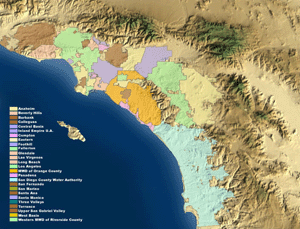The Metropolitan Water District of Southern California (MWD) is a consortium of 26 cities and water districts that provides drinking water to nearly 19 million people in parts of Los Angeles, Orange, San Diego, Riverside, San Bernardino and Ventura Counties. MWD currently delivers an average of 1.7 billion gallons of water per day to its 5,200 square-mile service area. It is the largest supplier of treated water in the United States.

During the mid-1990s, MWD and its member agencies embarked on a major new planning effort that represented a dramatic shift in the way they looked at water management. The focus of this process was to collectively examine all of the available resource options, both local and imported, together with conservation--in order to develop a least-cost plan that met the reliability and quality needs of the region. The result of this intensive effort was a 25-year Integrated Resources Plan (IRP) that offered a realistic means of achieving a reliable and affordable water supply well into this century.

In order to meet the challenges of this new planning effort, Metropolitan needed specialized planning tools. Metropolitan funded the development of IRPSIM, a computer model that played a key role in the planning process and that continues to play a critical role in ongoing planning at MWD and elsewhere. At its heart, IRPSIM is a simulation model that evaluates the uncertainties associated with demands and supplies over a long time horizon. IRPSIM allows MWD to integrate different supply, demand, climate, hydrology and demographic models to generate forecasts of water surpluses and shortages under different approaches to managing its vast storage and delivery system.
As of 2023, Metropolitan continues to rely on IRPSIM as the core engine to run its primary resource planning and sales forecasting models.
In 2013 Cross River partnered with DCSE, a software engineering firm near San Diego, to combine the IRPSIM model with a network optimization model designed by DCSE, to produce a powerful integrated tool that not only simulates water supply and demand, but also calculates the optimal means of allocating supplies and shortages under the constraints imposed by Metropolitan's complex distribution network.
In 2017 Cross River teamed with a group at the RAND Corporation to adapt IRPSIM to study the effects of climate change on future water supply reliability.